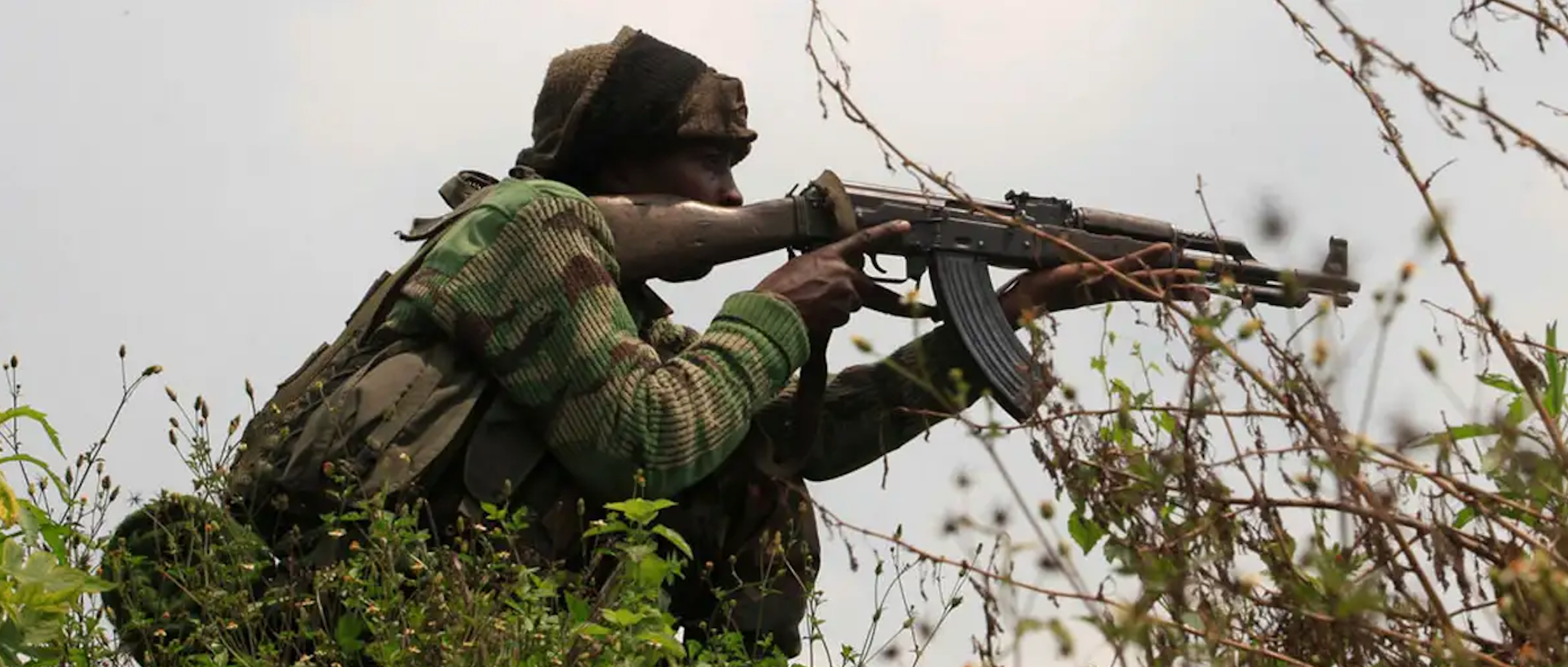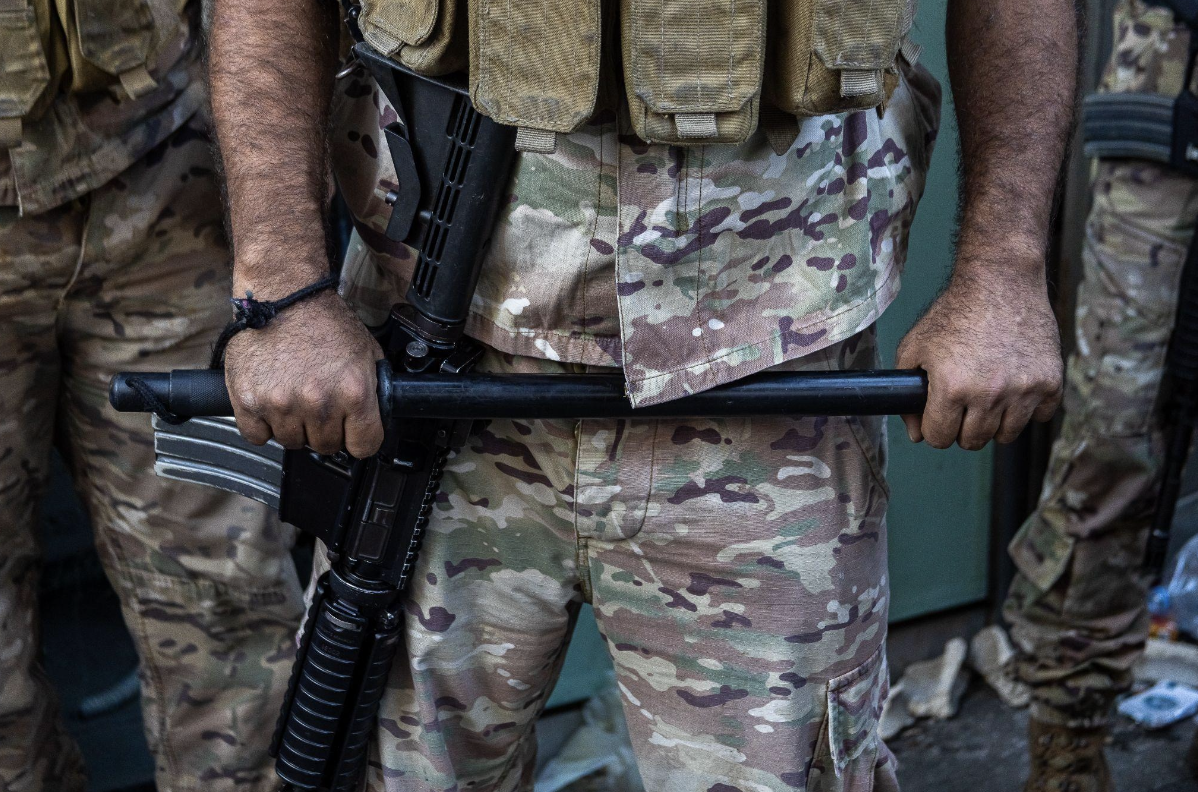Article: From Salt Lake City to the Jungle

From Salt Lake City to the Jungle
(Reuters photo)
BY GABRIEL FANELLI
Three Americans are among 37 defendants on trial in the Democratic Republic of the Congo (DRC) for participation in a coup attempt against President Felix Tshisekedi. Major Freddy Ehuma, the judge presiding over the trial, recently delivered a verdict – the death penalty for all 37. Two of the Americans are friends from Utah, and one of their fathers was the now deceased coup leader. When their arrest made headlines earlier this year, pictures of them bound and bloodied left many Americans wondering how two young men ended up at the heart of a coup attempt in one of the most dangerous countries in Africa. Their lawyer has plans to appeal their case, and the two men from Utah still have not had the opportunity to speak to anyone from the US Consulate – nor does it seem they will. Their fate, as well as an execution date, are unknown.
Nestled in the idyllic foothills of Utah’s Oquirrh Mountain range sits the populous Salt Lake City suburb of West Jordan. The nearby Jordan River gives the town its namesake, and it is the home of the world’s largest man-made excavation site – the Kennecott Copper Mine. Copper Hills High School is the Alma mater of the two young Utahns who found themselves at the forefront of an international incident this past spring when they were arrested in the DRC during the now infamous coup attempt. The two young men, Marcel Malanga and Tyler Thompson Jr. were teammates on the Copper Hills HS football team.
The boys flew to see Marcel’s father, Christian, who lived in Eswatini and extended an invite for Tyler and Marcel to fly to South Africa for free. Tyler planned to pilot drones to help Christian survey the gold mines he ran in South Africa. He believed this would look great on his CV, but the Thompson family was skeptical. Christian’s Wikipedia page listed him as a Congolese opposition politician, not a businessman. The father of eight moved to the states under a refugee relocation program as a teen. Living in the Salt Lake City area for some time, he worked as a car salesman before returning to Africa. Selling cars was not enough, his passion was in fighting against the government of Felix Tshisekedi.
Marcel posted on X often in the years prior to their trip to Africa. His bio says, “International Consultant,” and he calls himself an entrepreneur. He would list the number of smaller, often religious universities that had offered him scholarships to play college football, from Southern Virginia University to the University of Saint Mary. There is no sign he ever accepted any of the offers. His instagram tells another story. Calling himself a “mob$star” in his bio, his last post in March was a series of photos: a shot of the steering wheel inside a Tesla showing a large amount of cash on the center console, a guitar case with a box of Federal ammunition open on the top while he holds a loaded 9mm magazine. There was also a selfie of him pointing a 9mm at the camera saying, “snack time.” He finished with a screenshot of 1 Chronicles 29:11-12 declaring the glory and majesty of God. Tyler’s Instagram shows far less with only three photos, the last one in 2021. Despite the flaunting of cash and filtered photos of their life, they both appeared to be typical young men in their early 20s.
Marcel and Tyler showed no signs of future participation in a violent coup attempt, but it appears Christian convinced Marcel to join him at some point, and Tyler had no idea the true reason for this trip. Pictures of Marcel and his dad appeared before and during the coup. The before picture shows the father and son side by side in uniform, while Marcel is wearing body armor and helmet defiantly clenching his fist. The picture of the two during the coup shows Marcel dressed in all black with matching black body armor sporting a Velcro US Flag patch. A black AK-47 is slung across his front, but instead of the defiant look he had before he looks visibly scared. The picture is a still from the video of the operation, and quickly after, Marcel pulls a scarf over his face. Christian stands next to him with the look of a proud father. The next photos taken of Marcel and Tyler were of them surrounded by DRC soldiers, bloody and bound, with tears in their eyes.
The coup was live streamed on Facebook in a brazen display of hubris. Christian Malanga or “President Malanga” to his Facebook fan base, led roughly 40 men, mostly hired mercenaries from a small town, into the Presidential Palace, the Palais de la Nation. He delivered a speech denouncing Tshisekedi’s rule as corrupt and ineffective, demanding he leave office. He finished his speech yelling, “Felix, we’re coming for you n****.” Hours later he was shot dead by Presidential Palace guards while resisting arrest. Despite his demise, Marcel, Tyler and the other American, Christian’s so-called chief of staff, Benjamin Zalman-Polun, pressed on with the remainder of the assault force to find an escape route. DRC forces released another video showing the three Americans hiding amongst the reeds on the banks of the Congo River. When one of the men screams at Tyler in Lingala and he doesn’t respond, the soldier slams the butt of a rifle into his head. In the coming weeks, DRC forces speculated the three men were spies from the CIA sent to overthrow the government. This couldn’t be further from the truth.
In June 2024, Louise Callaghan of The Sunday Times reported on the troubled history between Marcel and his father. The mines Christian owned were worthless, and years earlier Christian, via Marcel, convinced the family of one of his high school friends to invest $240,000 dollars into mines in Mozambique. All that money was gone the moment it was given away. Christian needed it to prepare his future coup. He wanted to change the name of the DRC to “New Zaire,” a pipe dream which I don’t believe Tyler had any intention of helping try to realize, much less any clue he would be apart of. His inclusion into this trip was a ploy to add another member to the coup force.
According to Voice of America, Marcel told the Congolese tribunal that his father threatened to kill him and Tyler if they did not participate in the coup. This defense did not sway the prosecution. Tyler was also not the only person invited on this trip. According to the Associated Press, several other former players from the Copper Hills High School football team that knew Marcel were invited. While he told Tyler this was to fly drones for his father’s mining business, the other young men were told it would serve as a vacation and a service trip to build wells. Some were told this was a six-figure “security” job. All of them turned Marcel down. Tyler was the only one to fall prey to the younger Malanga, who was clearly getting his marching orders from the would-be dictator of New Zaire.
Marcel however, seemed to be just a boy who loved his father no matter what, and as delusional as his father was, he wanted to be apart of his life. Marcel’s mother frequently posted family photos on Facebook, and family was particularly important to Marcel. With the absence of his father from the bulk his teenage life, taking part in this coup was Marcel’s attempt at getting closer to a man who never cared enough to be a father. It is unfortunate that his attempt led to his father’s death and could lead to his.
Lucy Tamlyn, United States Ambassador to the DRC said in a statement, “We will cooperate with the DRC authorities to the fullest extent as they investigate these criminal acts and hold accountable any U.S. citizen involved in the criminal acts.” This statement is in keeping with the State Department not listing the three Americans as wrongfully detained. It does not look like Tyler or Marcel are going to be getting any special treatment in this matter just because they are Americans, and unlikely the U.S. will intervene in the legal affairs of the DRC on their behalf. For what its worth, Tyler’s family still believes he is innocent and continues to seek assistance from the State Department. All of the defendants have five days to appeal the death sentence, what happens next will be up to the Tshisekedi administration and the judge who is presiding over the case.









